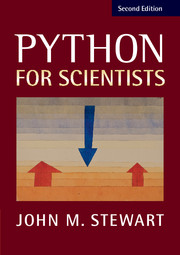
-
Select format
-
- Publisher:
- Cambridge University Press
- Publication date:
- 02 August 2017
- 20 July 2017
- ISBN:
- 9781108120241
- Dimensions:
- Weight & Pages:
- Dimensions:
- Weight & Pages:
You may already have access via personal or institutional login
Book description
Scientific Python is a significant public domain alternative to expensive proprietary software packages. This book teaches from scratch everything the working scientist needs to know using copious, downloadable, useful and adaptable code snippets. Readers will discover how easy it is to implement and test non-trivial mathematical algorithms and will be guided through the many freely available add-on modules. A range of examples, relevant to many different fields, illustrate the language's capabilities. The author also shows how to use pre-existing legacy code (usually in Fortran77) within the Python environment, thus avoiding the need to master the original code. In this new edition, several chapters have been re-written to reflect the IPython notebook style. With an extended index, an entirely new chapter discussing SymPy and a substantial increase in the number of code snippets, researchers and research students will be able to quickly acquire all the skills needed for using Python effectively.
Reviews
Review of first edition:‘… the practitioner who wants to learn Python will love it. This is the type of book I have been looking for to learn Python … concise, yet practical.'
Adhemar Bultheel Source: European Mathematical Society (euro-math-soc.eu)
'… I still think the conciseness of the book is a major asset. It provides just enough to get you started with the language if you are already familiar with some computer programming or with a system like Maple or Mathematica.'
Adhemar Bultheel Source: European Mathematical Society (euro-math-soc.eu)
'I highly recommend this book as a practical guide to real-life scientific programming. The book is well written, interspersed with great humor, and is presented from the viewpoint of a researcher who wants others to avoid suffering the same pitfalls and mistakes that he experienced.'
Andreas Rueger Source: The Leading Edge
'This book is a rich resource for scientists who are familiar with programming and want to go beyond classical commercial scientific programming packages such as Mathematica and Maple … if you want to expand your research toolbox and computational flexibility, this book is a fantastic find … I highly recommend this book as a practical guide to real-life scientific programming. The book is well written, interspersed with great humor, and is presented from the viewpoint of a researcher who wants others to avoid suffering the same pitfalls and mistakes that he experienced.'
Andreas Rueger Source: The Leading Edge
Contents
Metrics
Altmetric attention score
Full text views
Full text views help Loading metrics...
Loading metrics...
* Views captured on Cambridge Core between #date#. This data will be updated every 24 hours.
Usage data cannot currently be displayed.
Accessibility standard: Unknown
Why this information is here
This section outlines the accessibility features of this content - including support for screen readers, full keyboard navigation and high-contrast display options. This may not be relevant for you.
Accessibility Information
Accessibility compliance for the PDF of this book is currently unknown and may be updated in the future.


